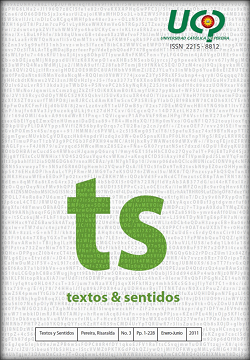The power of words in educational environments
Keywords:
language, education, classroom interaction, educational conceptions and practices, oralityAbstract
This paper presents a refl ection on the importance of language in educational scope, in particular about the power of words in the classroom. To develop this refl ection, we propose diff erent questions guiding this written text, including those ones concerning the importance of language, how to dialogue in educational contexts, which model students are setting up teachers’ words, and what kind of instructions and questions characterize educational environments. Hence, an analysis of the dynamics which are usually established in the classroom, the types of interaction that are conducive within, how they move on and who has the word in educational scenarios, is held. Finally, this article invites all diff erent levels of schooling teachers to open and keep up a space for refl ection on their own pedagogical practices, as an essential exercise for progressing in the construction of educational programs that encourage students to be more active, analytical, and foster them to have a word as well as recognizing others; taking the initiative and building knowledge through interactions including their cultural background embodying the texts.References
Austin, J.L. (1982). Cómo hacer cosas con palabras. Barcelona: Paidós.
Bárcena, F., & Mèlich J.C. (2000) La educación como acontecimiento ético. Barcelona: Paidós.
Bruner, J. (2000). La educación puerta de la cultura. Madrid: Aprendizaje Visor.
Correa, M. (2006). Contexto, interacción y conocimiento en el aula. Pensamiento Psicológico, 2 (7), 133 – 148.
De Castro, D, Salazar, J, y Ramos, S. (2007). Programa de intervención Narrativa, Poética y Memoria [Informe]. Grupo de investigación Lenguaje Cognición, Educación y Formación, Universidad del Valle, Cali.
De Castro, D. y Samboni, O. (2008). Programa de intervención Narrativa, Poética y Memoria [Informe]. Grupo de investigación Lenguaje Cognición, Educación y Formación, Universidad del Valle, Cali.
De Castro, D. (2008). Las prácticas educativas en nuestras instituciones [Ponencia]. Quinto encuentro de matemáticas colegios CONACED, Popayán, abril 11 de 2008.
García Molina, J. (2003). Dar (la) palabra. Deseo, don y ética en educación social. Barcelona: Editorial Gedisa.
Grice, P. (1983). “Lógica y conversación”. En: Lenguaje y Sociedad. Cali: Universidad del Valle.
Jurado Valencia, F. (2006) El poder de la palabra o la palabra del poder en la escuela. Revista Internacional Magisterio, 23, 16-19.
Neruda, P. (1984) Confi eso que he vivido: Memorias. Barcelona: Seis Barral.
Niño, R.M. (2009). La interacción en el aula en una secuencia didáctica para enseñar lenguaje escrito. Tesis de Maestría. Universidad del Valle.
Orozco, M. (2000) Los niños e sus difi cultades con el sistema notacional en base diez. Projeto, Porto Alegre, 3, 20-31.
Rincón, Rodriguez, De la Rosa, Chois y Niño. ¿Circula y se mueve la palabra en el aula? Revista Internacional Magisterio, 23, 20–24.
Rockwell, E. (1995). La escuela cotidiana. México: Fondo de Cultura Económica.
Sacks, H., Shegloff C.A. y Jeff erson G. (1974). A simplest sistematics for the organization of turn-talking in conversation. Language, 50, 4 (1), 696 – 735.
Sinclair J. y Coulthard (1975) Towards an analisys of discourse: The English used by teachers and pupils. Oxford: Oxford University Press.
Tusón, A. (1994) El arte de hablar en clase (sobre qué, cómo y para qué). En: Revista Aula de Innovación Educativa, N° 26, 15 – 19.

